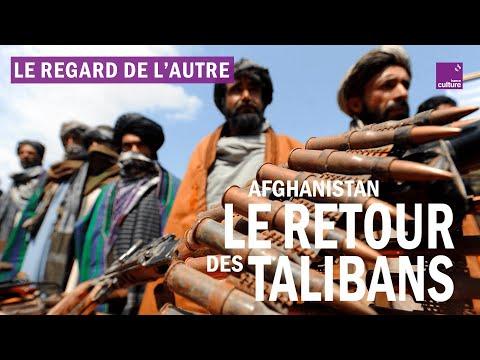Afghanistan: "an American fiasco by ignorance of the field and ideology of leaders"
Interview |We are still waiting for the announcement of the first Taliban government, after the departure of American troops on Monday.A page of history for Afghanistan and the United States, in particular.And Westerners who have not been able to take into account the specificities of the country, analyzes the geographer Fabrice Balanche.
But the mountain in Afghanistan is quite hospitable since many rivers cut the relief and allow intensive farming from the valley.And in the middle is a habitat ultimately quite dense, in the form of fortified houses, fortified villages, which pose the most problem to the Western armies.Obviously, taking these "green zone", green zones, as the military calls them, is similar both to urban combat and to combat in the jungle.Because insurgents can hide behind the low walls, in the bushes, in the fields, of corn in particular, with fairly lush vegetation in summer.And it is very difficult to control them because you cannot go back with tanks, not use armored vehicles.It is therefore a fight of infantrymen, and for the Western armies very concerned with their losses, it is difficult.
And what about the Afghan population?
It is a very rural country, with still three-quarters of residents in the countryside, a quarter in town, and a domination of Kabul, which on 40 million inhabitants has 5 million.And the city of Kabul has tripled in twenty years.Because there is an immense rural exodus, very strong population growth, the population doubles almost every twenty years.This is also what is problematic for Westerners.
This population, with this strong growth, does not allow the country to be developed.Demographic growth, ultimately, swallows all the benefits of development, created resentment and pushes a frustrated population to the Taliban or other Islamist groups to see a small westernized elite benefit from investments, benefit from very well paid jobsIn NGOs, in institutions that promote human rights, development.While the rest of the population, even in Kabul, lives in misery, in informal suburbs, under the thumb of warlords which even prevent investments because they want to keep the upper hand on this population.
But have the Westerners not entered all this data?
The soldiers, faced with this situation, discovered all of this on the ground.They adapted and they were able to control the territory at the start.They considered these data but they were not listened to by policies, they do not run.For example, the American general Patraeus, who was at the start in Afghanistan before being called in Iraq to set up his counter-insurgency strategy.This strategy, struggling with the realities of the field, using local tribes, worked at the start in Afghanistan, Iraq too.But the concern is that it happened too late.It was called to help to clog the breaches when the policies found themselves overwhelmed by the insurrection, by the bankruptcy of what they wanted to put in place.In the United States, between politicians and soldiers, everyone is in their silo, it is very marked.Everyone is in their specialty and you don't communicate so much.
Politicians were naively thought that once controlled the territory, the Taliban would be eliminated. However, the Taliban was not eliminated. They took refuge in Pakistan, in tribal Pachtounes areas, straddling the border. They took refuge in the caves and tunnels that had been dug in the mountains. Western leaders then said "now that we control the country, we will launch a process of development, democratization, modernization, etc. and it has started to spoil, as in Iraq when we dissolved the armed and government institutions. We completely neglected the tribal structure and ethnic diversity that made the country's unity by democratic route was simply not possible. Because Afghanistan is a country that has Forged by the force of its sovereigns. It was a buffer zone formed by the Russians and the British who did not want to come into contact in the 19th century, the British wanting to prevent the Russians from leading to the Indian Ocean, to control what The Rimland is called in geopolitics, that is to say the coast of Asia. This buffer zone had quite limited resources and did not interest many people. And that is why the country subsisted . The only ones who have succeeded in more or less the unity of Afghanistan were people to grip.

As in Iraq, or in Syria, the problem would therefore also be due to regimes, values, such as democracy or women's law, that Westerners tend to want to project on all these countries?
Absolutely.It is the heritage of the neoconservative ideology from the United States of the 1960s. An ideology rather on the left when it was born, that is to say wanting to be in the sense of history, promote thehuman rights, democracy.It is completely generous.At the time, we were in the Cold War and it was mainly applied to the countries of Communist Europe.After the September 11 attacks, George Bush son converted to neo-conservatism and wanted to apply the same theory in Iraq as in Eastern Europe.We saw the disaster that resulted.He also wanted to apply it, of course, to Afghanistan.
Afghanistan and Iraq have really been the laboratories of the American preservatives to set up their policies.And the soldiers, obviously, told them about their reserves.The military tried to counter the insurrection and the others wanted to build modern and democratic institutions.It didn't work, it doesn't work.
This policy of "regime changes", of the promotion of human rights, democracy, on societies not at all ready for these rapid developments can only lead to rejection, to frustrations, and therefore to aGeneralized insurrection against liberators.In addition to armed liberators.However, even the French Revolution has shown that armed liberators were difficult to welcome.
Some also question the role of NGOs and Western associations.
Not all NGOs, not MSF or those that make medical.But those who arrived to promote human rights, capacity building and others obviously attracted Afghan youth who was thirsty for modernity, but also by the wages they proposed, thanks to the possibilities of powerescape from the country.And all of these NGOs have prospered thanks to the US AID, to European Union funds.They resulted in creating a small urban elite completely disconnected from reality, which mostly came from good families and who had only contempt for the country's peasant mass, or even for the informal suburbs around.
To what extent can the Taliban new generation will continue to hold the country?
First, they learned from their mistakes from the late 90s, when they were in power in Afghanistan, and they will eliminate any opposition.The first thing they will do will be to eliminate opponents in the Panchir valley.Because it was from there, from the north of the country, based on the Tadjiks, the Uzbeks, on the Hazaras, that the American army finally took control of the country in 2001 against the Pachtounes.So they understood that if part of the territory escaped them, in the future, Westerners or others may want to use it against them.
The Taliban will also find themselves confronted fairly quickly with the problem of the country's population growth.Between 2000 and 2020, the population has doubled, we went from 20 million to 40 million inhabitants today.And it's not about to stop, with a fertility rate of 4.5 children per woman, with half of people who are under 20 years old.The population should still double by 2040, with a strong rural exodus, an explosion of Kabul.The population of Kabul has tripled in twenty years and it is expected to double in the next ten years, with informal neighborhoods which are in the majority and extend exponentially.The Taliban will have to manage the capital and some big cities with belts of misery around.
So one of the keys will be their network in the country?
The Taliban comes mainly from the Pachtoune ethnic group, the Pachtounes, which represent 40% of the Afghan population, that is the dominant but not majority ethnic group.Pachtounes are divided into several clans, several tribes, and the Taliban represent a kind of cement which makes it possible to unify these different clans behind this Islamist ideology and even to go beyond the Pachtoune ethnic group to seek from the Uzbeks, the Tadjiks and theTurkmens of the Allies.The only rebels to all of this are the Hazaras, Shiites and who live in the center of the country, west of Kabul.They will really be the victims of the Taliban, but everything will depend on the deal that the Taliban will pass with Iran because Iran wants to protect the Hazaras.
Pour afficher ce contenu Twitter, vous devez accepter les cookies Réseaux Sociaux.Ces cookies permettent de partager ou réagir directement sur les réseaux sociaux auxquels vous êtes connectés ou d'intégrer du contenu initialement posté sur ces réseaux sociaux. Ils permettent aussi aux réseaux sociaux d'utiliser vos visites sur nos sites et applications à des fins de personnalisation et de ciblage publicitaire.Gérer mes choixWith further population movements?
Once the Taliban has power, they apply their Islamist ideology.And all those who do not adhere to ideology will be eliminated or choose to leave.This can affect minorities or certain social categories: engineers, doctors, teachers, etc.Women will be relegated to the role of mother.The problem is that women can hardly take the path of exile alone.This is not obvious.At first, men leave and they then bring women.
This can be clans or ethnic groups like the Hazaras, many are already refugees in Iran.And, in any case, with such population growth in a country where resources are still limited, you can only have a strong emigration.Towards Iran, Tajikistan and Uzbekistan, the countries that are north.Anti-taliban will find it difficult to go through Pakistan because it is the Pachtoune region.
And we must not forget a third category: family revenge. Part of the Afghan population of which this famous former alliance of the North participated in the past in anti-taliban repression with the help of the American army. People have been killed, there have been atrocities, raped women, in a society where the Honor Code is extremely strong and where the law of the Talion applies. If you are a taliban and you go back to your village, you will therefore try to avenge your cousin, your uncle, which was killed by the tadjik militia of the neighboring village, which also took the opportunity to push the Pachtoune clan to which you belong , prick his land and who committed some crimes. This is what we observe everywhere today. The Taliban returns to their province, their villages, and people are eliminated because it is the law of the talion. All these people have an interest in leaving because they know that their life is at stake. Even if they are Islamists, even if they are pachtounes, family revenge is a terrible process. It's the same thing in Iraq and Syria.
With the collaboration of Audrey Dugast








